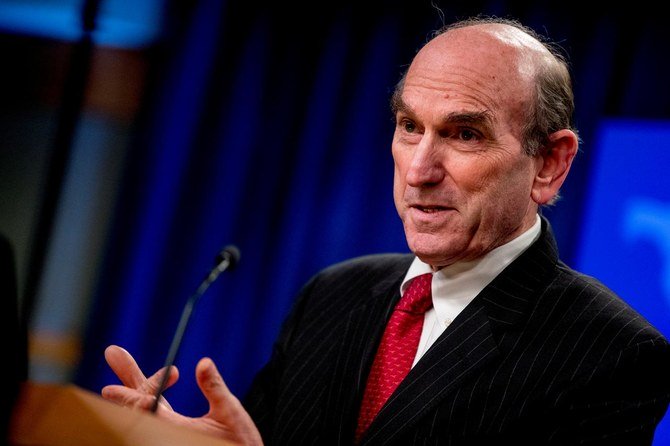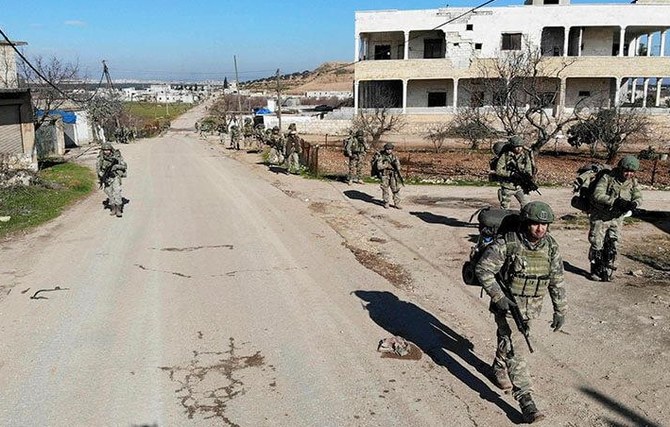NEW YORK: Elliot Abrams, the veteran diplomat taking over as US envoy to Iran, is entering the role at a crucial moment in the battle to curtail Tehran’s military power.
Secretary of State Mike Pompeo announced Thursday that Brian Hook would be handing over the role to Venezuela envoy Abrams, an eminent Iran hawk who will serve in both roles.
The transition takes place at a time when the US is struggling to win unanimous support at the UN for a formal extension of a ban on weapon sales to Iran, which expires in October.
Hook’s resignation after a year and a half in the job comes during times of increased tensions between the US and Iran. His departure puts an end to any chance for a diplomatic initiative with Iran before the end of Donald Trump’s term.
His replacement, Abrams, is one of the most prominent US neoconservative figures and an outspoken critic of the 2015 Iran nuclear deal.
The deal agreed with international powers and known as the Joint Comprehensive Plan of Action (JCPOA), aimed to restrict Iran’s atomic program in return for an easing of crippling sanctions.
Opponents, including Trump, said the agreement allowed Iran to continue developing ballistic missiles and freed up funds for the regime’s aggressive foreign policy in the Middle East. Trump pulled the US out of the deal in 2018.
Abrams had accused Barack Obama, the president who oversaw the agreement, of basing the deal on his so-called Cuba model.
“Hand a lifeline to a regime in deep economic trouble and ignore the population of the country and their quest for human rights and decent government,” he wrote in 2015.
“Call it a historic achievement, and above all don’t bargain hard for recompense. For, you see, in these openings to Iran and Cuba we are only righting the historical wrongs America has committed and for which we need to apologize.”
Of immediate concern for the US and its allies is trying to seal an extension to the UN arms embargo.
Abrams is expected to help campaign for such an extension as the US introduces a new resolution at the Security Council next week, while European nations continue to express fears that an embargo renewal would lead Iran to leaving the nuclear deal.
Russia and China, two of the permanent five nations that enjoy veto power on the Security Council, want the UN embargo on selling conventional weapons to Iran to end on Oct. 18, as laid out under a 2015 resolution.
Pompeo gave a clear indication this week that, should the US fail to secure an extension, it is considering “snap back” UN economic sanctions that were lifted as part of a nuclear deal with Iran.
“We have the capacity to execute snapback and we’re going to use it in a way that protects and defends America,” Pompeo told the Senate Foreign Relations Committee.
Since last year, Abrams has served as envoy for Venezuela. He was tapped for the role as the Trump administration was aiming to force President Nicolas Maduro from power.
Abrams and Hook were next door to each other at the State Department, and Abrams said that “most of what I hear about Iran policy is what I hear through the wall.”
In a talk along with Hook at the Hudson Institute, Abrams spoke of the nature of the newfound rapprochement between Venezuela and Iran, designating both countries as pariah regimes
“They are essentially friendless countries.
“So, they’re looking for a way to say, You see, we’re not really all that isolated.
“Then there’s the very pragmatic one. Maduro has one thing to sell which is oil and he desperately needs gasoline. Nobody’s buying the oil. He does have gold reserves, so he is able to say to the Iranians, ‘Well you want gold, I can give you gold.’
“And the Iranians of course have an enormous amount of oil and gasoline that they’re having a hard time getting rid of.”
Abrams’ vision for the American president’s role in the Middle East could be best summed up in his 2014 article for US website Politico on Obama titled “The man who broke the Middle East.”
In the piece, Abrams berates the then president for enabling Iran to hold sway over a stretch of territory from Tehran to the Mediterranean and abandoning Washington’s Gulf allies.
“A map that starts with Hezbollah in Beirut’s southern suburbs and traces lines through Syria and Iraq into Iran would now not be just a nightmare vision, but an actual accounting of where Iran’s forces and allies and sphere of influence lie,” he wrote.
“That’s what the Saudis, Emiratis, Kuwaitis and others see around them, growing year by year while their former [American] protector dithers.
“They see one other country that ‘gets it,’ sees the dangers the same way, understands Iran’s grasp at hegemony just as they do: Israel.
“In the world they all inhabit the weak disappear, and the strong survive and rule. They are the ultimate realists.”
Abrams, 72, rose to prominence in the 1980s under President Ronald Reagan as a hawkish interventionist against perceived communist threats in Latin America.
As the then-assistant secretary of state, he played a pivotal role in the Iran-Contra affair in 1991, when he was convicted on two misdemeanor counts of withholding information from Congress.
He was later pardoned by President George H. W. Bush in 1992.
For the outgoing Iran envoy, Hook, Pompeo praised his efforts achieving “historic results countering the Iranian regime.”
Hook had worked very closely with Pompeo to execute Trump’s “maximum pressure” policy toward Iran.
He singled out Hook’s successful effort to release two American captives, Michael White and Xiyue Wang, from Iranian prison.
In an interview with the New York Times, Hook insisted that Iran is now weaker.
“Deal or no deal, we have been very successful. By almost every metric, the regime and its terrorist proxies are weaker than three and a half years ago.”






















